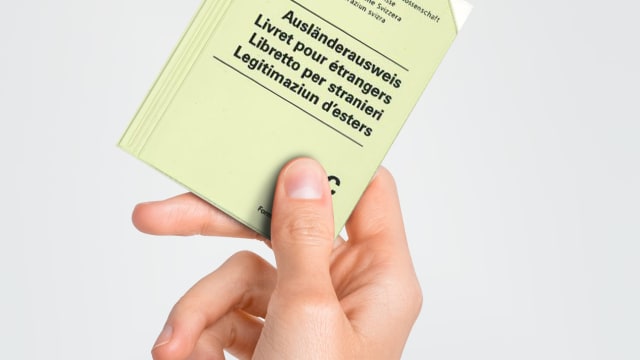Unemployment benefit in Switzerland for foreigners – what applies to you?
Entitlement to unemployment benefit in Switzerland: your entitlements as a foreign national. Comparis explains what you need to know.

14.02.2024

iStock/Drazen_
1. Unemployment benefit in Switzerland: what’s my entitlement as a foreigner?
As a foreigner, you are entitled to support if you become unemployed. This is independent of your citizenship. In order to claim this, you need to meet several requirements:
Employment of at least twelve months within the last two years: this allows you to pay the minimum amount into compulsory unemployment insurance.
Valid settlement or residence permit.
You had what are known as “insured” earnings and you were subject to social security contributions in Switzerland. Your unemployment benefit is then calculated on the basis of a “daily allowance”.
You are no longer in compulsory school. Compulsory schooling is up until the age of 15.
You have not yet reached the OASI retirement age. This is 65 for men. By 2028, the retirement age for women will be raised from 64 to 65.
You are ready to accept a position that matches your professional profile.
You are able and authorized to take on new work.
You apply for new jobs during your termination notice period. In the case of a fixed-term employment contract, you start looking for work three months before it ends.
You are participating in integration measures.
Earnings between 500 francs and 12,350 francs per month are insured. If the salary is higher, any income over 12,350 francs is not taken into account.
Good to know: a special agreement applies for first-time arrivals from Germany. Contribution periods completed in Germany are fully credited in Switzerland.
Unemployment benefits for self-employed foreigners
Self-employed persons are not entitled to unemployment benefits in Switzerland. There are two exceptions:
You have been employed for at least twelve months in the last two years. If this is the case, the minimum contribution time already applies.
You are already unemployed and would like to take up self-employment. If so, you can get unemployment benefit for at most 90 days of your planning period. To do this, you must meet the following criteria:
You meet all eligibility requirements for unemployment benefit.
You have become unemployed through no fault of your own.
You are at least 20 years old.
You can present a project to start an economically viable and permanent self-employed activity.
For the self-employed, disability insurance can be useful. However, it only covers incapacity for work, such as if you become ill or have an accident.
Unemployment benefit after graduation
Many students don’t pay into unemployment insurance during their studies. If you don’t find a job after graduation, you are still entitled to unemployment benefits. There is a condition, however: you must have lived in Switzerland for at least ten years.
2. How do I get unemployment benefits?
Have you become unemployed, or do you know that you will soon be unemployed? If so, register with the Regional Employment Centre as soon as possible. This can be done in person or online.
You will need to bring the following documents with you for easy registration:
AHV number which is on your health insurance card
official ID
residence certificate
settlement or residence permit
proof of job search
3. Calculating unemployment benefit in Switzerland
The daily allowance is normally 70% of your insured salary. However: the amount of unemployment benefit you can receive in Switzerland is a maximum of 80% of your previous earnings. For the maximum amount, you must fulfil the following criteria:
You have dependent children under the age of 25.
Your insured earnings are a maximum of 3,797 francs.
You have a disability level of at least 40%.
Good to know: your insured earnings are calculated based on the average value of your salary over the last six or twelve months.
Unemployment benefits: maximum amount in Switzerland
In Switzerland, you will receive a maximum of 9,880 francs per month in unemployment benefits.
Maximum amount = maximum insured salary × maximum percentage share (0.7 or 0.8).
Unemployment benefit in Switzerland: duration of payouts
The unemployment compensation is paid out as what is known as a daily allowance. The maximum is 520 daily allowances. The payout duration depends on various factors:
your contribution period
your age
whether you have dependent children
whether you receive a disability pension with a degree of disability of at least 40%
whether you are close to OASI retirement age
If you become unemployed up to four years before retirement, you are entitled to an additional 120 daily allowances. That’s about 5.5 months. An exception applies if you are exempt from contributions.
Extension of entitlement to daily allowance
Under certain conditions, you can extend your daily allowance entitlement:
you are turning 25 years old
you are turning 55 years old and have a contribution period of 22 months in the last two years
you are under 25 years old and will become dependent
you are over 25 years old. You have a contribution period of over 22 months. You have been awarded at least 40% disability. All three points must apply.
In these cases, you can also apply for more new daily allowance after your previous allowance period has expired.
When is daily allowance not paid out?
Did you leave your last job? If so, you will not receive unemployment compensation immediately. The Regional Employment Centre refers to this payment freeze as “termination days”. If you leave your job of your own accord, this period is usually between 30 and 60 days.
You can also be given “termination days” for other reasons. This could be if you don’t give enough effort into finding a new job or you don’t follow the Regional Employment Centre’s instructions.
Depending on your previous salary, you will not receive your daily allowance immediately. You will first have to wait through the "waiting days" period.
| Insured earnings per month in CHF | Waiting days with dependent children | Waiting days without dependent children |
|---|---|---|
| Up to 3,000 | 0 | 0 |
| 3,001 to 5,000 | 0 | 5 |
| 5,001 to 7,500 | 5 | 10 |
| 7,501 to 10,416 | 5 | 15 |
| from 10,417 | 5 | 20 |
Source: canton of St. Gallen
4. Unemployed and expired in Switzerland: entitlement to social assistance
“Expired” means you’ve received all your daily allowances and haven’t found a new job during this time. What’s next?
Before receiving social assistance, you must use up all other sources of money. These include, for example, any insurance and money from relatives, as well as your savings in your account. There is an exempt amount you can keep:
for individuals: 4,000 francs
for couples: 8,000 francs
if you have a family: 10,000 francs
Persons with secured right of residence can also apply for social assistance. You need the following documents for this:
all documents relating to your bank and postal accounts
your tenancy agreement
your health insurance policy
information about work and health
the reason for your assistance request
Staff working at social assistance will calculate how much you receive using your documents. This money covers your basic needs.
Important: you only receive social assistance if you are actively working to improve your situation. This means you submit job applications and accept reasonable job offers.
5. Swiss unemployment benefits with a residence permit: will I lose it?
Losing your job may affect your residence permit. However, this depends on your permit and your citizenship.
The cross-border worker G permit is a work permit. You usually receive unemployment benefits from your country of residence. You will receive unemployment compensation from Switzerland in the following cases:
short-time work
insolvency of company
bad weather
Are you not from an EU/EFTA country? If not, your current permit is tied to the job. It expires when your employment ends. EU/EFTA members have the right to work in Switzerland.
EU/EFTA citizen
You can stay up to six months after your employment ends in Switzerland. You need to have enough money for this. An exception applies if you will still receive unemployment benefits. In this case, your right of residence ends when the payments end.
Online registration procedure
If you work in Switzerland for a maximum of three months, you do not need a residence permit as an EU/EFTA citizen. You register through an online registration procedure.
You can apply for a job search. This is valid for three months. You must have sufficient money and you aren’t entitled to social assistance.short-term residence L permit for your
Third-country nationals
Your right of residence ends when your permit expires. Under certain circumstances, the Migration Office may withdraw your right of residence in advance.
EU/EFTA citizen
In the first year of residence
Your right of residence expires six months after your permit expires. An exception applies if you will still receive unemployment benefits. In this case, your right of residence ends when the payments end.
If you receive welfare services, your right of residence can be withdrawn immediately. Supplementary benefits do not count as welfare services.
After the first year of residence
You may reside in Switzerland for up to six months after your permit expires. If you receive unemployment benefits, your right of residence ends upon becoming “expired”.
Is your new position limited to less than one year? The Migration Office can then convert your B permit into an L permit.
Third-country nationals
Your residence permit expires upon loss of employment at the end of its validity period. In individual cases, the Migration Office may revoke your permit beforehand.
Under certain circumstances, you may be able to submit a application to extend your right of residence. This applies:
for the duration of your unemployment compensation.
if you are in an employment program for the unemployed.
You don’t lose your permit if you become unemployed. If you are dependent on social assistance, the Migration Office may cancel your permit.
If you meet the integration criteria (Art. 58a FNIA), the Migration Office may downgrade your permit to a B permit. If you become unemployed, you won’t meet the criterion of participation in economic life.
Other rules apply in the event of unemployment due to:
illness
accidents
disability
As part of a family reunification, you also have a right to stay (Art. 4 Appendix I FZA).
6. Can I receive my Swiss unemployment benefit in another country?
You generally receive your unemployment benefit in your country of residence. Exceptions apply in the event of job loss due to:
short-time work
insolvency of company
bad weather
Forms U1 and U2
Complete forms U1 and U2. Form U1 certifies your insurance periods for unemployment benefits. With form U2, you can "export" your entitlement to unemployment benefits.
The U1 form issues you with unemployment insurance. You can obtain the U2 form from the Regional Employment Centre. More information can be found at the State Secretariat for Economic Affairs.
This article was first published on 02.04.2009



